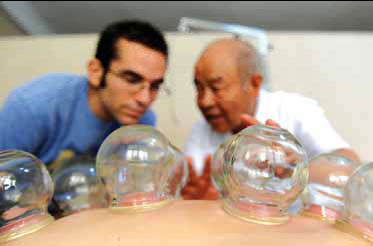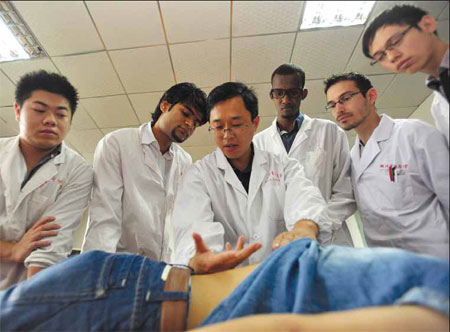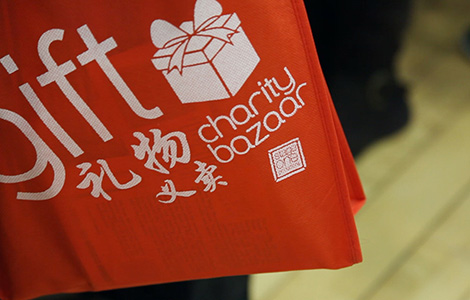Healthy alternative proves popular
Updated: 2013-11-22 10:31
By Liu Zhihua (China Daily Europe)
|
|||||||||||
Traditional Chinese medicine gets a commercial boost as demand from overseas rises steadily
Old is proving to be gold for traditional Chinese medicine practitioners, with overseas patients seeking alternative therapies for chronic ailments, and expatriates, businesses and students embracing the ancient practice.
TCM dates back more than 4,000 years and differs from Western medical practice in that it focuses more on preventive care and increasing resistance to disease.
Though TCM has spread to many countries, it is now seeing a strong resurgence within China, buoyed by demand from medical tourists and expatriates.
It took a big step earlier this year with dedicated TCM clinics for high-end foreign clients in major Chinese cities.
Dongzhimen Hospital, affiliated to the Beijing University of Chinese Medicine, was one of the first dedicated TCM hospitals for foreigners in Beijing.
TCM industry experts attribute the rise of these clinics to the burgeoning global tourism market. According to industry estimates, more than 6 million people travel internationally each year for medical treatment, while the size of the global medical tourism market was about $100 billion (74 billion euros) in 2012.
While there is no data available on the total number of foreigners seeking TCM treatment in China, or the share of TCM in the overall medical tourism market, many like Brigitte Winklehner from Austria believe it is the best available form of alternative treatment.
Winklehner, president of Eurasia-Pacific Uninet, a network that establishes contacts and scientific partnerships between Austrian universities and research institutions in Asia and the Pacific region, says that TCM has removed her pain and the need for a surgery.
Winklehner, who has been shuttling in and out of China since 1995, says her interest in TCM started after she read about the ancient form of medicine.
"My first tryst with TCM began in 2003 after hip-replacement surgery," she says. "After the surgery, I started suffering from severe pain and numbness in my left leg below the knee, something that made mobility difficult.
"The hospital in Austria suggested that I should have another operation. I did not want to go under the knife again and instead opted for acupuncture, an alternative treatment."
Winklehner underwent the first round of acupuncture treatment from a Greek doctor in Austria, who was trained in China.
"The acupuncture relieved my pain, and I could walk with crutches. I decided to go to Shanghai to continue the follow-up treatment as I felt that experienced Chinese doctors would provide better treatment."
She says her decision proved to be the right one as after a few sessions in Shanghai, she could walk without much pain. "Acupuncture treatment helped rid me of the nagging pain in my left shoulder and encouraged me to start taking TCM herbs for general wellbeing," she says.
TCM holds that the human body is an organic and systematic whole, and various ailments are a reflection of the imbalanced state that stops organs from operating in a harmonized way. The essence of the treatment is to maintain a balance within the body and between the body and mind, and then achieve harmony with the outer world, experts say.
"It is difficult for foreigners to understand the TCM philosophy as they have a different cultural background," says Han Feng, marketing manager of Oriental Inter-Cultural Medical, a Beijing-based TCM clinic focused on foreign clients.
"More and more foreigners are coming to China, and they are slowly becoming more receptive and willing to take TCM therapies," he says.
The clinic offers a variety of TCM treatments, including herbs, acupuncture, massage and cupping, with doctors speaking Mandarin, English and Japanese.
"Most of the patients are from Japan, Europe and the US. They are keen on natural therapies, and TCM is all about nature and balance," Han says, adding that they also conduct TCM training sessions for foreigners.
Alex Tan from Australia is one of the few foreigners who have set up a successful TCM practice in Beijing. Tan, holding degrees in both engineering and TCM, runs the Straight Bamboo TCM clinic and a spa in Sanlitun, and a TCM practice at The Hutong, an expatriate-run Chinese cultural center in the heart of Beijing.
The real benefit of TCM is its greater focus on preventive health, wellness and lifestyle practices, and less focus on reactive, clinical medicine, says Tan, whose father is Chinese.
"The key focus of TCM is about learning how we can live in accordance with nature to avoid illness and diseases," he says.
Tan might be brought up under two cultures, but he is just one of the foreigners in China who aspire to be TCM practitioners.
Li Xiaoli, director of international student affairs at the Beijing University of Chinese Medicine, says that the growing popularity of TCM may prompt the university to increase the intake of foreign students. Currently, the university has more than 1,000 international students on its rolls, Li says.
Tou Yingxiang from Malaysia is one of the international students who have chosen TCM as a career option. He has already studied TCM for five years in China, and plans to study for another three years.
Tou says he chose TCM because it not only treats health conditions, but also focuses on the body's ability to heal, and on promoting preventive measures against illness.
He says that he expects to get a position in a Chinese public hospital after his graduation, so he can learn and practice with TCM experts.
"Most of the international students go back to their home countries after graduation," says Huang Yunyu, deputy director of the International Clinic at the Dongzhimen Hospital, which is affiliated to the university.
For others like Winklehner, the TCM journey is also about knowledge sharing. She says her mission is to bring together scientists from China and Austria to conduct research on the techniques and advantages of TCM, to popularize it across the world.
liuzhihua@chinadaily.com.cn
|
Above: More than 400 foreign students are studying at the Hubei University of Chinese Medicine. Below: A college student from the United States studies traditional Chinese medicine with a senior doctor in Linfen, Shanxi province. Photos by Xinhua |

(China Daily European Weekly 11/22/2013 page10)
Today's Top News
Nuclear power 'to fall short of demand'
Caroline Kennedy visits tsunami-struck areas
China to loosen airspace control
China inks regulation to ban official extravagance
9 in police custody after pipeline blasts
Experts doubt smog linked to low birthrate
China, Romania seal railway deals
Cameron visit a chance to boost ties
Hot Topics
Lunar probe , China growth forecasts, Emission rules get tougher, China seen through 'colored lens', International board,
Editor's Picks

|

|

|

|

|

|






